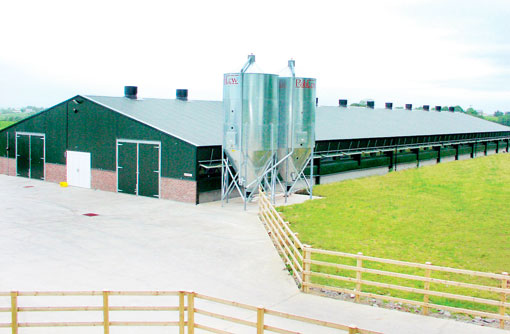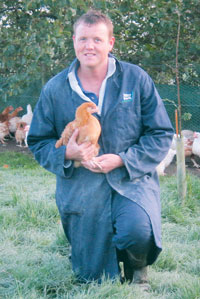Moy Park goes from strength to strength

Scott Casey visits one of Europe’s largest poultry producers in its Northern Ireland base to find out how they conduct their business sustainably.
No business that employs more than 10,000 people can be considered small, but Moy Park still has the feel of a smaller firm, with a loyal cohort of small, traditional farmers willing to give glowing testimony.
Emerging from a post-war collective of farmers who had grown hemp for making parachutes, Moy Park was a company that led poultry from a Sunday treat to being a feature dish on dinner tables across the UK.
Sourcing from 800 farmers across the country, 600 of whom are in Northern Ireland alone, a strong, diversified contract-farmer base is a hallmark of Moy Park.
There is mutual dependence between the company and farmers, with Moy Park reliant on farmers to install the welfare enhancements their exacting customers, such as Waitrose and Marks & Spencer, demand, and farmers reliant on long-term payments to recoup their costs.
Windows are a key part of this, with Moy Park beginning to install windows in its poultry sheds on a large scale about 10 years ago, in response to a request for “higher-welfare” birds from Waitrose.
Now M&S, the Co-op, Morrisons, Tesco and even Ikea’s in-store kitchens serve chicken raised in Moy Park’s bright, airy sheds, with most stocked at 30kg/m sq.
“You can see it when you go out to the sheds (with windows) – the birds are much more active, their heads are up, and if you enrich the environment further with straw bales or perches, you get even more activity,” says director of agriculture David Gibson.
“When you close the windows in the house, you see the whole house calm down and their heads go down like a classic British chicken house, then you open the windows up and before your eyes they perk up.
“Farmers were worried these birds would run around and use up more energy and eat more feed, but we haven’t seen that. We don’t see any downside. But you do need to have the insulation values, the ability to close the windows, etc. You still need to manage the windows in the house, but that’s all part of the day-to-day management.”
Today, the windows are made from shatterproof glass, similar to that used in car windscreens, filled with argon for better insulation in winter, and are designed not to fog or deteriorate in UV light.
By the end of 2012, 60% of Moy Park’s producers across the UK will have sheds with windows, supplying up to 75% of the light and contributing to the company’s goal to reduce energy use and produce as much as they can.
The unexpected benefit of reducing lighting costs by installing windows has led Moy Park to other technologies to reduce energy use in its processing and packing plants, and on farm to lower overheads for farmers.
“The farmer is interested in how he can get his energy bill down, whether it’s lux meters, LED lighting, heat recovery, or underfloor heating. As well as that we are looking at them generating their own energy using biomass, wind or PV,” says Mr Gibson.
“What we find is the picture is changing with the tariffs. We need to know what is best to recommend to farmers regarding energy reduction and what is the best renewable energy to use on their farm.”
Moy Park has been working towards building a large-scale litter burning plant near Glenavy, in County Antrim, through its share in renewables company Rose Energy.
The £100m 30-MW project would see Moy Park send 250,000t of bedding, manure and processing waste to be incinerated each year, providing power to 25,000 homes and helping farmers meet the EU’s NVZ legislation requirements.
The project has been awaiting planning permission from the Northern Ireland Assembly, though a final decision is still awaited.
Case study: John Richardson, Aglish, Dungannon
For more than 200 years, John Richardson’s family has farmed a 30-acre parcel of land at Aglish in Dungannon and, since giving up work at a local linen mill in 2002, he has raised organic chickens in alpine-style wooden barns.
 Mr Richardson says that going into organic chicken was a natural progression. “I have this small 30-acre farm and really, when you look at it, you couldn’t go into anything big like cows. So it suited growing free-range chicken because each shed needs eight acres around it,” he said.
Mr Richardson says that going into organic chicken was a natural progression. “I have this small 30-acre farm and really, when you look at it, you couldn’t go into anything big like cows. So it suited growing free-range chicken because each shed needs eight acres around it,” he said.
“I like growing them organically. I like the fact the birds are in a different weight range, it’s nice. I feed them every morning, and it’s got completely natural ventilation.”
Because of the size of the farm, the lack of available land for sale around the farm, and the current downturn in organic sales, Mr Richardson doesn’t think he will be able to expand any further.
“I think the idea with organic is that they don’t want you to become massive, with 10 chicken houses or something. They just want you to really look after the birds,” he said.
“The worry at the moment is the recession and that organic is having a slower turnaround. I think that the people buying organic now are those that enjoy that way of life and the standard the chicken is.
“It’s not so bad that I wouldn’t be putting chickens through the houses each year, so it’s still OK.”
Farm facts
• 30 acres
• Three sheds
• 7,400 birds in each house
• All organic
Case study: Tommy Troughton, Grange Farm, Dungannon
Tommy Troughton has farmed broilers close to Moy Park’s Dungannon processing plant for the past eight years and is one of the pioneers of installing windows in sheds.
Mr Troughton originally produced eggs on the farm supplying local catering businesses. But a friendship with Moy Park’s then managing director Eric Read, and a need to provide an income for sons returning to the farm, made him move into broilers.
“We farm beef cattle and it is fairly physical work. I find with the poultry it’s certainly work, but it’s also commonsense and it’s not hard work,” said Mr Troughton.
“One of my sons he looks after it mostly now. It is an income for him. I’ve got two sons at home and with 120,000 birds it’s a full-time job for him.”
Far from being settled with his already sizeable poultry concern, Mr Troughton wants to expand to meet demand for more birds.
“Expansion is what we are discussing at the minute. We’re trying to get planning permission for another two houses, so if the sons want to expand, and Moy Park is happy for us to expand, then the sky is the limit as far as I’m concerned,” he said.
